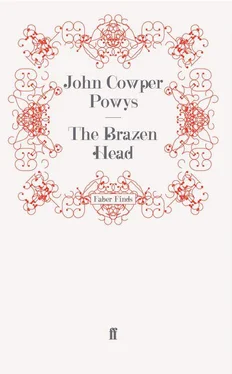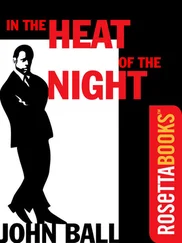“You go down with Turgo, Sonny!” she cried. “Your father’s a wounded man. I can’t possibly let him fight with those devils! Only for Christ’s blessed sake take care of yourself, son. I don’t want you wounded too!”
Only once before in all his life had the Lord of Cone been required by the fate or by the chance that governs us all to make a psychic effort comparable with the one he had to make now. But he succeeded in making it; and the apparent ease with which he accepted the issue, when he had done so, was a triumph for his personality of which not a soul present had the faintest shadow of an idea.
“All right my dear; I’ll stay with you. Off you go, William! Do whatever Turgo thinks best when you’re down there. That little fool John has no right to bring his Dad’s men into our place. But I’ve heard he’s the best disciple the Friar’s got round here; and we know what these students are! Keep an eye on our lad, Turgo, my friend. Remember he’s the youngest knight of the oldest king in Christendom! I should say we do indeed need Lord Edward here; and I warrant these confounded lands he’s crusading in, whether they’re Arabian or Christian, will go on in the same turmoil whether he’s there or not.”
By the time the Lord of Cone had completely covered up the heart-heaving moral effort he’d just made in thus remaining in the library of his Castle, both Turgo and Sir William had reached the stairs, the latter much more concerned with the arrangement of the weapons in his own belt than with the whereabouts of the son of his sovereign, and the door had been closed behind them.
Ulanda promptly pushed both her quiescent lord into his chair and sliding down upon her knee drew his head towards her own. But it was then that the goddess of chance displayed her most devilish impishness. In the impetuosity of this gesture of affection the impulsive lady had forgotten a certain most perilously explosive inhibition in her own nerves; namely her loathing of beards.
But now, as their heads met, her husband’s curly beard tickled her cheek. By long practice she had acquired the art of kissing him without incurring this contact. But the truth was that she had come to be obsessed of late more than ever before by this loathing for, and intolerable disgust at, the touch of a man’s beard. The Baron indeed had recently begun to grow aware of this nervous mania of hers, and he often found himself wondering why at an earlier stage in their alliance she had not protested against his refusal to shave. This refusal of his was wholly instinctive.
He was constitutionally slow-moving; and was addicted to the habit of adapting himself to existing conditions; and one of the most obvious of such conditions was the simple law of Nature that the chins of men grew beards. Thus between these two persons there inevitably existed, lodged in the physical make-up of them both, the perilous possibility of a bodily, primeval, skin-for-skin quarrel of a serious kind.
It was an unfortunate coincidence however that at the very moment when her cheek was touched by the lips she loved and the beard she hated, there should have come to her ears from outside their secluded retreat, and even from outside the Castle itself, tumultuous cries and shouts and the noise of blows mixed with resounding yells of anger and pain.
These sounds may possibly have intensified her feelings by adding to her nervous mania a shiver of anxiety, though not more than a shiver, about her son. In a mad reaction against the touch of that bushy beard, she leapt up from his knee and uttered a piercing scream of rage, that flew out into the night like a wild bird whose wings were on fire.
It might well have happened that such a scream, rising from aggravated feminine nerves, and whirling off into the darkness from a height above the tops of the tallest trees, especially when the court-yard and gateway of the place were resounding with blows and cries, would have dissolved in the air unregarded by anyone except the two persons concerned.
But either by another random hit from the wanton bow of chance or, let us hope, by some special intervention of a brave man’s guardian angel, this scream from Ulanda gave to the death-pangs of young Ralph Gaulter of Evercreech the one thing needed to wholly redeem his desperation.
Gaulter had only just entered the service of the Baron of Cone, and he had only done so because of a savage tragedy, three or four generations ago, when his great-grandmother, Matilda Gaulter, had been raped by one of the Lords of Roque. But at the moment of Ulanda’s piercing scream that seemed to come down from heaven, young Gaulter was on his back on the grass with one of the red-brown bandits kneeling on his chest and pressing a broad and rusty kitchen-knife deep into his neck.
From his childhood he had heard tales of this ancestress of his, her beauty, her pride and her pitiful end, and now in his death throes the idea took hold of him that he was giving up his life in some mysterious way for this dead woman’s living sake, and that this cry from above actually came from Matilda Gaulter.
Thus as the pressure of that broken, broad-headed, rusty knife just below the apple of his throat made his life-blood spurt forth from beneath his chin till it drenched his distorted and desperate face, the dying youth felt absolutely convinced that he really was, in these death-gasps and under these spouts of blood, sacrificing his life for this old ancestress of his who had been so horribly wronged.
Black gulfs of death might swallow up his body and threaten his soul, but the fairy-tale Great-Granny of all the years of his life was saved forever!
Ralph Gaulter was the only one who, in this irresponsible three-cornered hurly-burly, lost his life. Others were wounded in the confusion but none of them mortally; while in the struggle of young John and his couple of henchmen with the red-brown bandits from Lost Towers it soon became clear that it was this latter group — tipsy though half of them were, and wildly excited though all of them were — who were destined to win; though when they had carried the Brazen Head away into the forest, and so well out of reach of all possible rescue or recovery, that Bonaventura himself felt justified in returning to the Priory, young John and his two companions obstinately pursued them.
Bonaventura evidently felt sure that when his red-brown allies had grown a little more sober they would finish the job and pound the Head to pieces. What really saved this unparalleled invention from destruction was not the protective magic, whether we call it “black” or “white”, of its creator. It was something, though it is impossible to say exactly what, in the Head itself, just as if by some inexplicable chance the creative energy in the Friar had overreached its proper scientific limits, and had created a being capable, not only of personifying its own identity, but of escaping altogether from the control of its creator.
By the power of his immense sacerdotal reputation over the whole of Europe, Bonaventura had finally managed so to convince the Prior that he had some special mandate from the Holy Father at Rome, that he was actually permitted to lead his bodyguard of reckless devils into the Friar’s chamber. Here he had made them open the sacred alcove and wrench from its recess and carry downstairs the imperturbable Head.
With the person of Bacon himself he could not meddle, for the Prior of Bumset was alone responsible for his official prisoner; but it was a startling as well as a bewildering surprise to him when the Friar made not the very faintest attempt to resist this sacrilegious and autocratic invasion of his chamber, but from an absolutely calm and wholly preoccupied absorption in what he was writing at his table, simply looked up once or twice, neither smiling nor frowning, but treating the whole incident as if the General of the Order and his piratical allies were so many negligible mice.
Читать дальше











